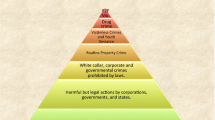Abstract
In this article, I examine the ways in which “Public Reason” (or public reasons, in plural) can be said to resonate with some types of reasons as presented and defended in contemporary legal theory. I begin by identifying the concept of Public Reason within the context of a discussion sparked by the between “internal” and “external” reasons, which was made famous by Bernard Williams. I will then compare this interpretation of Public Reason with Joseph Raz’s celebrated concept of exclusionary reasons. Next, I refer to two concepts of moral “neutrality” and how such concepts affect our understanding of Public Reason. I also reflect upon whether it is tenable to draw a distinction between the good reasons for actions that we conduct in our own lives and good reasons to be adopted in public life. Finally, I raise the question of a distinction between the reasons which we press in general societal discourse and those that we press in the advocacy-related law-making process.
Similar content being viewed by others
Notes
Rawls (1993), 66–67.
See Quong (2011), 256–57.
Williams (2005), 3–7.
Id, 7.
Elefthariadis (2008), 57.
Gaus (2011), 233.
Williams (1981), 101.
Id, 112.
Id, 107.
Id, 110.
Id, 105.
See Sadurski (1990), 111–19.
Williams (1981), 103, emphasis added.
Id, 104.
Williams (1995), 35.
Id, 38, emphasis in original.
Harsanyi (1985), 69.
Williams (1981), 105.
Goodin (1986), 82.
John Stuart Mill, “On liberty” (1859) in Mill (1989), 96.
Regan (1985), 57.
Williams (1995), 36, emphasis added.
Dworkin (1978), 248–253.
I am grateful to Michael Sevel for the discussion of this and related points.
Raz (1999), 39.
Raz, id 38. Of course, not all second-order reasons are exclusionary, see id, 184–85.
Waldron (1999), 196.
See Waldron (2007), 107–134.
Raz (1999), 184.
Raz (1986), 46.
Id, 46.
Id, 46.
Raz (1999), 183.
For discussion, see Sadurski (1990).
A strong connection between a liberal ideal of “impartiality” (a word used in a similar fashion to neutrality) and the ideal of “public justification” (of which the ideal of Public Reason is a part) is the strong underlying feature of a classical article by Nagel (1987), 215–40.
Patten (2012), 257.
See, e.g., Quong (2011), 18.
Id, 218–19.
Nagel (1987), 221.
Nagel (1987), 230.
Elefthariadis (2008), 58.
Rawls (1993), 56–57.
See Id, 56.
This is the point made forcefully by Jeremy Waldron who endorses the idea of burdens of judgment and then extends upon the field of political disagreement (or disagreement about justice), see Waldron (1999), 112–13 and 151–53. Waldron is correct to argue that there may be reasonable disagreement about justice (or more generally, political action) but incorrect, in my view, that sources of disagreement are the same regarding the conceptions of the good and the conceptions of justice.
Nagel (1987), 232.
Quong, (2011), 195.
Raz (1990). Note that Raz’s article had been published before Rawls’s (1993) appeared and addresses mainly, as far as Rawls is concerned, his two articles which had foreshadowed the book: “Justice as fairness: political not metaphysical,” (Rawls 1985) and “The idea of an overlapping consensus,” (Rawls 1987).
Raz (1990), 23, reference omitted.
Id, 23.
Id, 23.
Quong (2011), 232–233.
Id, 23.
Id, 42 n. 85.
Rawls (1999), 144.
Id, 153.
Id, 153.
Id, 154.
Larmore (2008), 210.
Dryzek (2000), 169, emphasis added.
Id, 169, italics removed.
Waldron (2015), 132.
Rawls (1999), 154.
Waldron (2015), 132.
References
Arneson RJ (1990) Neutrality and utility. Can J Philos 20:215–240
Darwall S (2010) Authority and reasons: exclusionary and second-personal. Ethics 120:257–278
Dryzek JS (2000) Deliberative democracy and deyond. Oxford University Press, Oxford
Dworkin R (1978) Taking rights seriously. Duckworth, London
Elefthariadis P (2008) Legal rights. Oxford University Press, Oxford
Gaus G (2011) The order of public reason. Cambridge University Press, Cambridge
Goodin RE (1986) Laundering preferences. In: Elster J, Hylland A (eds) Foundations of social choice theory. Cambridge University Press, Cambridge, pp 75–101
Harsanyi JC (1985) On preferences, promises, and the coordination problem: reply to Regan. Ethics 96:68–73
Larmore C (2008) The autonomy of morality. Cambridge University Press, New York
Mill JS (1989) In: Collini S (ed) On liberty and other writings. Cambridge University Press, Cambridge
Nagel T (1987) Moral conflict and political legitimacy. Philos Public Aff 16:215–240
Patten A (2012) Liberal neutrality: a reinterpretation and defense. J Polit Philos 20:249–272
Quong J (2011) Liberalism without perfection. Oxford University Press, Oxford at 256-57
Rawls J (1985) Justice as fairness: political not metaphysical. Philos Public Aff 14:225–251
Rawls J (1987) The idea of an overlapping consensus. Oxf J Leg Stud 7:1–25
Rawls J (1993) Political liberalism. Columbia University Press, New York
Rawls J (1999) The idea of public reason revisited. In: The law of peoples. Harvard University Press, Cambridge
Raz J (1986) The morality of freedom. Clarendon Press, Oxford
Raz J (1990) Facing diversity: the case of epistemic abstinence. Philos Public Aff 19:3–46
Raz J (1999) Practical reason and norms, 2nd edn. Oxford University Press, Oxford
Raz J (2010) On respect, authority, and neutrality: a response. Ethics 120:279–301
Regan D (1985) On preferences and promises: a response to Harsanyi. Ethics 96:56–67
Sadurski W (1990) Moral pluralism and legal neutrality. Kluwer, Dordrecht
Waldron J (1999) Law and disagreement. Oxford University Press, Oxford
Waldron J (2007) Public reason and ‘justification’ in the courtroom. J Law Philos Cult 1
Waldron J (2015) Isolating public reasons. In: Brooks T, Nussbaum MC (eds) Rawls’s Political Liberalism. Columbia University Press, New York, pp 113–137
Williams B (1981) Internal and external reasons. In: Williams B (ed) Moral luck. Cambridge University Press, Cambridge, pp 101–113
Williams B (1995) Internal reasons and the obscurity of blame. In: Making sense of humanity. Cambridge University Press, Cambridge, pp 35–45
Williams B (2005) In the beginning was the deed. Princeton University Press, Princeton
Author information
Authors and Affiliations
Corresponding author
Rights and permissions
About this article
Cite this article
Sadurski, W. Public Reason in the Universe of Reasons. Jus Cogens 1, 41–58 (2019). https://doi.org/10.1007/s42439-019-00004-y
Published:
Issue Date:
DOI: https://doi.org/10.1007/s42439-019-00004-y




